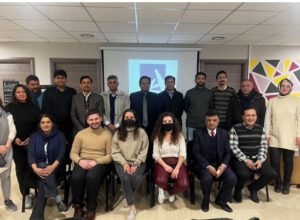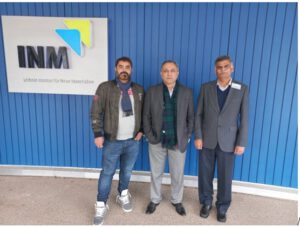Author: Dr. Khalid Iqbal*
Four staff members from the University of Gujrat visited Athens University of Business and Economics (AUEB), Greece, and Saarland University (UDS), Germany, for the period from 19 March 2022 to 01 April 2022.
Mr. Shahzada Babar, Manager BIC and ORIC, Dr. Mirza Ashfaq Ahmed, Associate Professor, Department of Management Sciences, Mr. Ghaffar Mohi-ud-Din, Assistant Professor, Department of Design, School of Art, Design, and Architecture (SADA), and Dr. Khalid Iqbal, Deputy Manager (R&D), Office of Research, Innovation, and Commercialization (ORIC), were among the visiting staff.
The visit was paid for exposure to entrepreneurial universities in Greece and Germany, feedback and evaluation from all partner universities, and presentations and discussion on best practices of start-ups, innovations, and science parks in the European context.
The Athens Centre for Entrepreneurship and Innovation (ACEin) of the Athens University of Economics and Business (AUEB) in Greece has been effectively playing a pivotal role practically for supporting young and potential entrepreneurs and researchers to turn their innovative and research-based ideas into a sustainable business models. The center is subsequently helpful in opening start-up companies to address specific business issues by establishing collaborations with start-up teams and tech-talented people both from the faculty and the market. It has been learned during the presentations and interactive sessions in the ACEin that the entrepreneurial and research teams in the BICs anywhere in the world can be successful only if they are supported and guided by the specialized staff of coaches, mentors, and experts, from among the faculty, market and the community, having a deep market and technical expertise to accelerate product development and growth opportunities not only in the local but also in the global market as well. Further, it has also been learned that the collaboration of commercial banks with the universities for the financial support of the start-ups may be very effective for developing the entrepreneurial culture in the universities.
Presentations and discussions on ‘Working and Functions of the ACEin’, ‘Incubation Stages and Coaching Process’ and ‘Building Entrepreneurship Networks All Over Europe’ were very informative and knowledgeable, while, question-answer sessions on ‘Creation of a Technology-Transfer Office in the AUEB’, ‘Essence of Coaching and How to Guide Startups into Success’ and ‘NBG Bank and AUEB’ were extremely valuable. Feedback on the ‘Inter-Departmental Entrepreneurial Assignment (IDEA) Project presentation of the ‘Visit to Saarbrucken’ and the ‘Entrepreneurial Manual’ discussion was commendable.


In the University of Saarland, Germany, the integrated web of innovation labs, incubation centers, and science parks connected with multidisciplinary research teams, faculty members, and experts of various fields was found to be the principal and the prime key to making the university entrepreneurial. Moreover, equipment in the Materials Science and Engineering labs of Saarland University was found to be the most modern and hi-tech, particularly for the physical and mechanical characterization of the various materials. It was learned that cohesion in the whole entrepreneurial web is the master key for the success in transforming academic knowledge into an entrepreneurial set-up.
Presentations and question-answer sessions on ‘Potentials of International Networks at Saarland University, ‘Start-ups at Different Stages during Entrepreneurial Journey’, ‘Moderated Discussion and Reflection about Strategic Action Plans (WP2)’, ‘Incubation of an IT Startups’, ‘Moderated Discussion about Entrepreneurship Course (WP4)’, ‘Review of the Trip and Discussion on Way Forward for the Project’ and ‘Discussion on Next Steps for Projects’ remained interactive and useful.
The visits to the FabLabs at HBK and CoHub in Germany also proved productive. During the visits, it was realized in the real sense how equipment and machines in the FabLabs help and play a role in implementing interactive art and design projects. Additionally, it was made clear as to how digital production methods such as CNC milling, 3D printing, laser cutting, digital sensors, and actuators work in developing designs by going through the stages of brainstorming, product development, technical drawing, and the implementation of a prototype. In a tour of the wood workshop, classic handicraft techniques and digital manufacturing systems such as 3D printing or CNC milling were observed as well.
Specific strategic action plans for the project were also developed, in addition to discussion and planning for Fablab installation in the University of Gujrat. The list of Fablab equipment was also discussed and finalized during the visit.
The ultimate and the most important lesson learnt from the visit is that the universities in Pakistan should enhance the capacity and space to develop and establish more and more incubation centers, innovation labs and science parks, in addition to the FabLabs, and connect them as an integrated web with multidisciplinary research teams, faculty members and experts of various fields, following the models of University of Saarland in Germany and Athens University of Economics and Business in Greece, to transform these academic institutions to entrepreneurial.
*The writer works as Deputy Manager (R&D) in the Office of Research, Innovation, and Commercialization (ORIC) of the University of Gujrat, Pakistan.